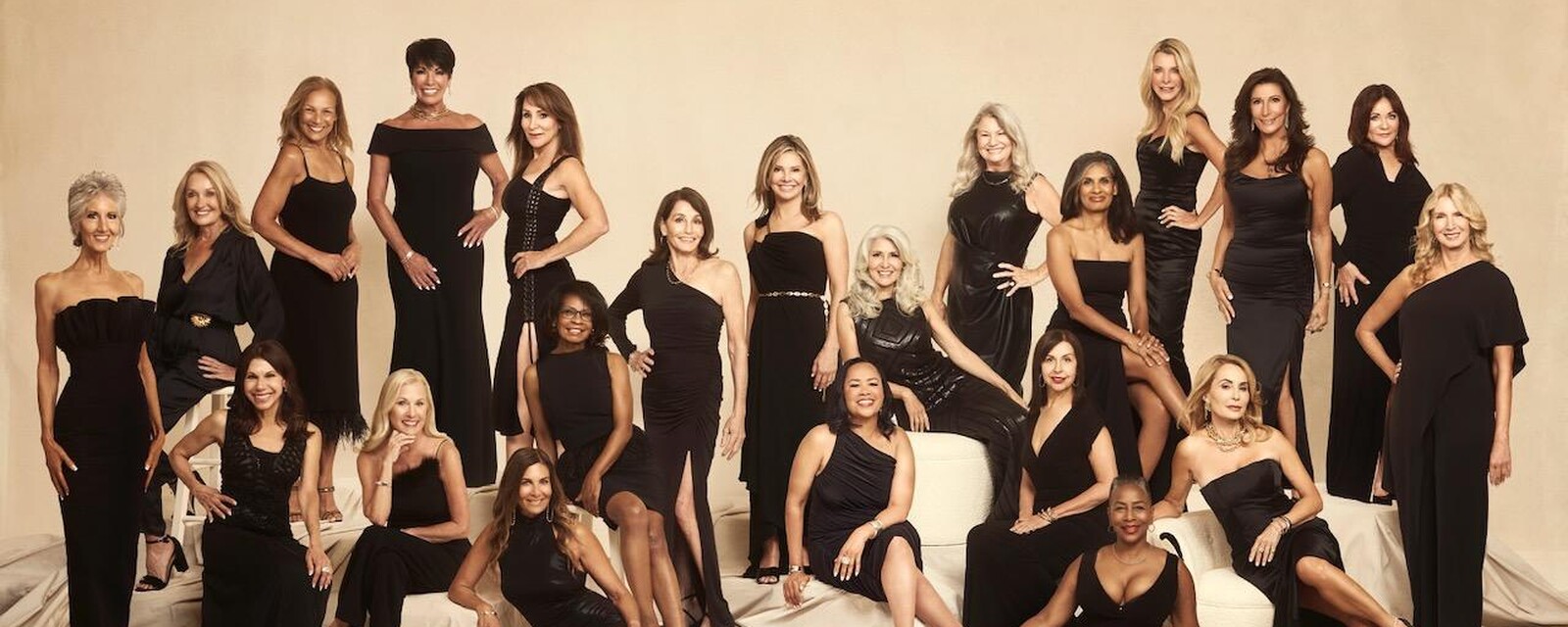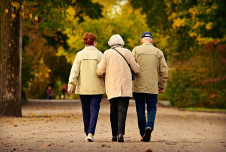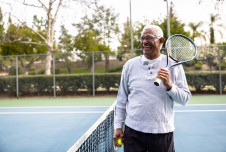Whether you’ve ever watched an episode of The Bachelor or not, The Golden Bachelor—the latest iteration of the ABC reality TV show franchise that features an eligible bachelor who dates multiple women over a few weeks in search of finding love and perhaps a spouse—is like no other.
For the first time ever, the bachelor isn’t in his 20s or 30s and maybe looking to start a family—the “golden bachelor” is 72, widowed, retired, a father, and a grandfather. And the 22 women who have been vying for his love and devotion since the first episode aired on September 28 are in their 60s and 70s—many also widowed, retired, mothers, and grandmothers.
In other words, each already has a life, a full one. Depending whose take on it you relate to, the show is either the best thing that’s ever happened in capturing that experience or the worst.
But The Golden Bachelor also presents an opportunity to ask ourselves a question: What does the search for love look like in the so-called Third Age?
Well, different. Different from that of younger people, yes—but also different for men and women. The “reality TV” of The Golden Bachelor may not, in fact, be reality, but the show has things to say that can help us understand the real world in which we are all aging together.
Golden double standards
At 72, Gerry Turner is tall and fit with the kind of chiseled look many women would be attracted to. He’s described as “obviously handsome” and “uncommonly slim and good-looking.”
The female contestants look nothing like Turner’s wife of 43 years, who died suddenly at age 65, who was described as having a thick waist. Yet their looks don’t always get the same glowing reviews Turner gets, even though they actually seem to be aging a lot like him. In other words, just fine, thank you, and I’m not just talking about the personal trainer and former professional figure skater who has run 10 marathons.
It’s as if people are skeptical of or at least surprised by what everyday women—not just celebrities—in their 60s and older can look and act like. Perhaps there’s been some nipping and tucking, hair dyeing and boob augmentation, but it’s unknown if Turner himself has had some work done, too. Clearly, he’s been spray-tanned.
But there’s often pushback on women who want to look younger than their age—or just naturally look younger than their age, as if everyone in their 60s or 70s looks the same.
Some, like author Mireille Silcoff, want women to age like the women of past generations. In a New York Times opinion piece, “Why ‘The Golden Bachelor’ Terrifies Me,” she longs for the gray-haired women of the eternally popular mid-1980s sitcom The Golden Girls. Two of the actors, Bea Arthur and Betty White, were actually in their 60s but played women in their 50s.
She lauds Concetta “Aunt Chippy” Potenza, Jimmy Kimmel’s 80-something-year-old aunt who makes a brief appearance in The Golden Bachelor’s first episode and is dressed “like a normal person in her 80s.” Silcoff imagines Kimmel’s auntie cozy at home, feet up and on the phone with a grandkid. Aunt Chippy is staying in her lane—she’s grandmotherly and presumably thankful she no longer has to be young.
Thus, it seems, there are two narratives for women in their 60s and older—the grumpy old lady or the sweet old lady, often a grandmother. Neither is universally accurate. And The Golden Bachelor is busting those narratives.
As NPR pop culture critic Linda Holmes observes:
Something awful happens to the pop-culture take on smart, sharp-witted people when they have the audacity to age beyond some unspecified point. It seems especially true for women. . . . The way we appreciate older women is often to defang them, turn them into fuzzy little stuffed animals—and it’s unfair to them.
The Golden Bachelor’s contestants aren’t “fuzzy little stuffed animals.” They, like any single woman their age who is interested in dating—and many aren’t—are going to present themselves as best they can. At an age when society considers women invisible and asexual, these 22 women know that relying solely on their looks and bod isn’t enough to attract a partner.
Although you can bet that once filming ended and they returned to their regular lives, their evening gowns went back in the closet and their false eyelashes were tucked carefully away!
Finding the happy middle
That said, singles in their 60s and older are the least likely to compromise on a potential partner’s attractiveness, according to the annual “Singles in America” survey—perhaps, as researcher Helen Fisher observes, because they don’t feel as much pressure to find a romantic partner as they may have felt when they were younger.
Women who had lived and loved for decades might want to have someone around to do fun things with, but many believe they’ll be fine whether they find a romantic partner or not, a study finds. In other words, they date to enhance whatever they already have going on.
We generally don’t see women in their 60s and older presented in the media as many of them actually are—vibrant, intelligent, confident, accomplished.
True, the kind of women who would want to be on a reality dating TV show and the kind of women a casting agent would choose for a reality dating TV show would be women who have those qualities. A woman who isn’t comfortable in her skin, who laments the loss of her youth, who is merely surviving and not thriving as she ages, does not make for very compelling TV, or a very compelling romantic partner, either.
It’s no accident that the contestants are also fit and active. Fitness isn’t just for vanity. Research indicates it’s extremely important as we age, boosting our mental health and emotional, psychological, and social well-being, as well as cognitive function. All that pickleball matters—Turner is an avid player, as are some of his potential loves.
 © ABC
© ABC
We also don’t see older women in popular culture clearly interested in having sex—at least until the 2023 movie Good Luck to You, Leo Grande, in which Emma Thompson plays a 55-year-old sexually inexperienced widow who hires a much-younger sex worker. Nor do we often see men in their 70s interested in dating women around their own age, although, granted, many of the contestants are 10 or more years younger than Turner—still a pretty big age spread.
It’s true that The Golden Bachelor is presenting one of the two unfortunate narratives society casts people into as they age—the “sexy senior,” which focuses on remaining youthful, staying productive, and “aging well” versus the less-upbeat narrative of decline, which views aging as little more than a future of frailty, dependency, loss, and unhappiness.
There is a happy middle, which shows up in some of the conversations Turner and the women have had. They are open about their losses, their vulnerabilities, their priorities, and their hopes for the future. That’s the kind of wisdom and practicality that often comes with having lived and loved for decades and all the experiences that brings.
While some are disappointed that the show has chosen the “sexy senior” narrative, many people in their 60s and 70s—and even older—are still interested in being sexual. And that’s not bad. Being sexual is considered a lifelong activity and an essential part of healthy aging, or what is sadly often called “aging well” or “aging successfully.”
But because the thought of older people doing it often elicits a loud, collective “ew,” even among some health care providers—Medicare mandates doctors to assess an older person’s vision, hearing, memory, and balance, but not their sex life—sexually transmitted infections have more than doubled in the past decade in the U.S. among adults age 65 years and older, especially among widows and divorcees. When we don’t expect old people to be sexual, they can suffer.
Still, what the show hasn’t truly addressed are some of the non-sexy challenges of later-in-life romance.
How much does family matter?
One of Turner’s rules while online dating was that he wouldn’t date a woman who lived more than 60 miles away from his Indiana home. He had to let go of that rule to be on the show, but it’s clear that someone is going to have to uproot their life to be closer to the other.
Will Turner be willing to sell his lakeside “dream” house and move away from his two daughters and two granddaughters? Will whomever he chooses want to uproot her life for a man who lives states away from her home, her adult children, grandchildren, and community, and where she likely knows no one? Or would Turner and his new love become “live apart together” romantic partners—a growing phenomenon for later-in-life relationships—traveling to and from their respective homes to spend time together a few days, weeks, or months at a time?
In reality if not reality TV, what often complicates that decision is family. Many of the female contestants said one of the biggest joys in their life was spending time with their grandchildren, something Turner also says he cherishes. But if he moves closer to his new love, will he be as supportive of her family caregiving?
According to a recent study by social scientist Lauren E. Harris, perhaps not. Harris surveyed 100 single men and women in their 60s and 70s to see how family caregiving responsibilities impact how desirable they are to the opposite sex. What she discovered was that the men often found single women in their age group to be less desirable as a partner if they were heavily involved in caregiving adult children, elderly parents, or grandchildren, which women often are.
Indeed, two of the contestants decided to leave the show for family reasons, although one chose to stay even though she missed her daughter’s wedding—perhaps a decision that will impact that relationship for years to come.
In other words, the men wanted to be No. 1 and not have to share much, if any, of their partner’s time, energy, and attention. Meanwhile, the women found men who were close to their families to be more desirable, perceiving their caregiving “as a sign of good character and family orientation.”
But caregiving responsibilities aren’t the only challenge to later-in-life love. Having adult children can often be hazardous to a new romantic relationship.
Turner’s daughters and granddaughters have seemingly been supportive and encouraging of his search for a new love, although they may not fully have considered how a new woman in their father’s life may affect them. They might have less time with him if he spends more time with his new partner and her family.
When Northern California author Eve Pell married a widower when she was 71 and he was 81, she initially found resistance from his children. “That was a huge surprise,” she tells me. Many of the couples who shared their stories with her for her 2015 book, Love, Again: The Wisdom of Unexpected Romance, had similar responses.
Adult children can be as resentful as younger children, notes Wednesday Martin, author of the 2009 book Stepmonster: A New Look at Why Real Stepmothers Think, Feel, and Act the Way We Do. They may feel uncomfortable seeing their mom or dad being affectionate with a new partner, or feel competitive with them, or feel pressured to have a relationship with them even if they’re not too fond of them.
“As the kids get older, issues like estate planning and inheritance can come into play, adding an extra layer of anxiety and resentment,” she writes.
Losing a potential inheritance, whether they deserve it or not, is a big concern for adult children, says the late author and psychology professor Nancy Kalish:
They may worry that the assets that would have been theirs, after the death of the surviving parent, will go to the new spouse instead. For this reason, some adult sons and daughters I have spoken to resent every penny that their parent spends with the new spouse and may even tell the parent this whenever a big purchase is made.
And then there are going to have to be discussions about long-term care and end-of-life medical planning—not easy conversations for many long-married couples and their families, let alone newly enmeshed families who are likely to face those concerns sooner than later.
The show will be long done by the time those issues become a reality for Turner and whomever he chooses, if they even do. They might not.
Still, The Golden Bachelor, as imperfect a show as it may be, is groundbreaking in that it creates space for having much larger, much-needed, and long-overdue conversations about desire and desirability as we age. In the process, it busts quite a few harmful ageist and sexist narratives.







Comments